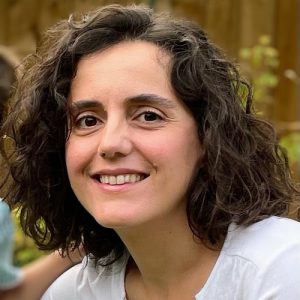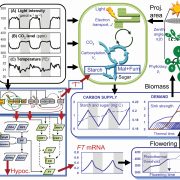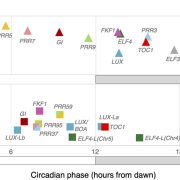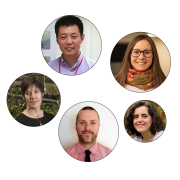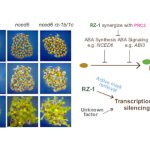Plant Physiology Webinar: October 18th. Focus Issue on Circadian Rhythms (Part 2)
Plant Physiology Webinar: Celebrating the October 2022 Focus Issue on Circadian Rhythms (Part 2)
Recorded Tuesday, October 18 2022
About this Webinar
Circadian rhythms are ubiquitous across eukaryotes, but are perhaps of particular importance to plants. In all model organisms studied to date, these roughly 24-hour rhythms in physiology, growth, or development are generated by cell-autonomous oscillators or clocks. However, the complexity of the circadian clock network and the scope of processes influenced by circadian rhythms in plants outstrip those observed in other eukaryotes, highlighting the importance of circadian rhythms for the optimization of plant growth in a constantly fluctuating environment. Indeed, work over the past decade has implicated selection at clock loci during crop domestication and during natural and artificial selection for growth at diverse latitudes.
Organized by Focus Issue editors Stacey Harmer, Alex Webb, and Christian Fankhauser, this webinar features speakers James Locke, Dawn Nagel, and Todd Michael sharing findings from their work appearing in this Focus Issue. It’s hosted by Alex Webb and moderated by Eva Herrero Serrano.
SPEAKERS
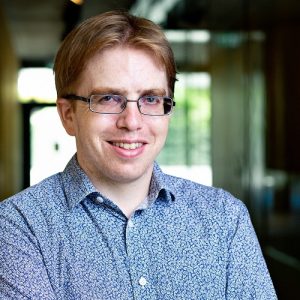 James Locke: Spatially specific mechanisms and functions of the plant clock
James Locke: Spatially specific mechanisms and functions of the plant clock
James Locke is a group leader at the Sainsbury Laboratory, University of Cambridge. His group is interested in how different types of gene expression dynamics are generated and what their consequences are for the organism. These dynamics include robust oscillations, such as those generated by the circadian clock in plants, as well as the stochastic pulses of gene expression often observed in bacterial stress response pathways. His group uses a combination of time-lapse microscopy, mathematical modelling, and synthetic biology approaches to understand the design principles behind dynamic gene regulation.
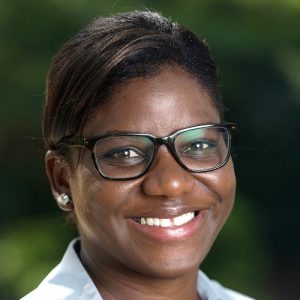 Dawn Nagel: Circadian regulation of temperature stress responses in plants
Dawn Nagel: Circadian regulation of temperature stress responses in plants
Dawn Nagel is an Assistant Professor in the Department of Botany and Plant Sciences at the University of California, Riverside. She obtained her PhD from the University of Georgia and did her postdoctoral work in the lab of Dr. Steve Kay on circadian clock regulation in Arabidopsis. Research in her lab focuses on understanding the regulatory links between the circadian clock and environmental stress in plants.
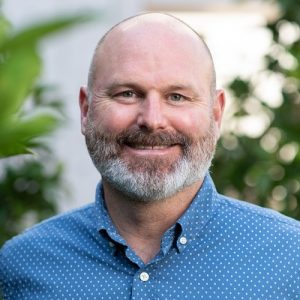 Todd Michael: The circadian clock and time of day networks shape plant genome architecture
Todd Michael: The circadian clock and time of day networks shape plant genome architecture
Todd Michael is a Research Professor in the Plant Molecular and Cellular Biology Laboratory at the Salk Institute for Biological Studies in San Diego, California. Before joining the Salk in 2019, Dr. Michael held academic positions at Rutgers University and the J. Craig Venter Institute (JCVI), and Industry positions at Monsanto and Abbott Laboratories, where his group sequenced thousands of plant, animal, and microbial genomes. Dr. Michael obtained his PhD from Dartmouth College with Rob McClung where he focused on the role of the circadian clock in controlling time-of-day specific gene expression. Currently the lab is focused on building tools for pangenome analysis and leveraging time-of-day networks to develop crops that sequester more carbon to fight climate change, under the Salk’s Harnessing Plant Initiative (HPI).
MODERATOR
Eva Herrero Serrano is a postdoc at the Department of Plant Sciences, University of Cambridge in the UK. Her research aims to understand how dynamics of protein complex formation modulates the activity of transcription factors to change gene expression. She obtained her PhD at the Max Planck Institute for Plant Breeding Research in Cologne, Germany, where she studied the molecular basis of ELF3 and ELF4 pivotal function in the Arabidopsis circadian clock. During her first postdoc at the Francis Crick Institute in London, she investigated the control of asymmetric protein partitioning during yeast cell division. Currently, she is investigating why WD40 scaffold proteins are essential to generate circadian rhythms of gene expression.
HOST
Alex Webb is a professor at the University of Cambridge in the UK. His research focuses on working out how plants measure time by studying the circadian clock and identifying how it provides benefits to plants to maximize plant growth and productivity. His group is particularly interested in how the circadian oscillator regulates physiology (e.g., Ca2+ signaling) and how the oscillator is regulated by physiological signals (e.g., sugars from photosynthesis). He obtained his PhD from the University of Lancaster, UK.


